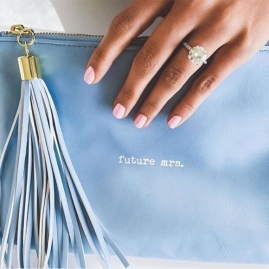 He just proposed, the excitement is at an all-time high and it’s time to begin planning the wedding. First thing’s first: pick a date. Sounds easy, right? Maybe you’re set on a date but it’s booked and you have to choose a different one or maybe you have no clue when you want your wedding to be; but, in order to choose a date, you first need to decide what season you want the wedding to take place in. This is the difficult part, considering there are pros and cons to each season.
He just proposed, the excitement is at an all-time high and it’s time to begin planning the wedding. First thing’s first: pick a date. Sounds easy, right? Maybe you’re set on a date but it’s booked and you have to choose a different one or maybe you have no clue when you want your wedding to be; but, in order to choose a date, you first need to decide what season you want the wedding to take place in. This is the difficult part, considering there are pros and cons to each season.
You’ve all heard of “wedding season:” The months where wedding venues are booked week after week. Wedding season tends to be around summer – late May through September. During these months, it will be much more difficult to get the date you want with the exact venue that you want. Similarly, if you are hoping for a short engagement with a large wedding, you may need to wait until a different season. You run the risk of many of your potential guests being on vacation or previously committed to attending another wedding on the same day as yours.
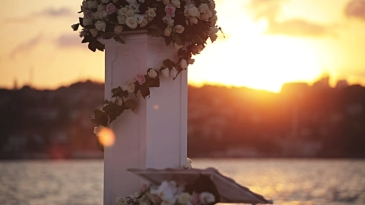
The summer season is the most popular wedding season because it allows for a much wider variety than some other seasons and, due to daylight saving time, the sun sometimes doesn’t set until 9pm. Although, with more sun comes more, drawn out heat. Temperatures during mid-summer months can easily reach mid-to-high 90’s. This can make guests very uncomfortable if your wedding takes place in an outdoor venue and the bride runs the risk of sweating off her hair and makeup.
However, with the heat aside, the food menus tend to be fresher with more local options during the summer wedding season because many popular fruits and vegetables are in their peak, such as blueberries, peaches, watermelon, green beans and zucchini. Floral availability also tends to be higher during these summer months. Peonies, Iris’, Roses, Orchids, and Sunflowers are just some of the flowers whose peak bloom is during these summer months.
Fall is the month of cozy sweaters, football, bonfires, pumpkin spice, and hot apple cider. If heat is a big turn-off for you and your groom, you may want to consider having a fall wedding. The weather is milder and the temperatures will cool as the season progresses. It is dependable and predictable, you run less of a risk of having those summer evening thunderstorms that the Southeast United States in known for. Daylight saving time is still on your side, the sun doesn’t set too late in the day depending on what month of fall your wedding is in. This gives you a little more leeway to save money and use the nature that is around you. Fall is one of the best seasons for an outdoor wedding.
The biggest downside to having a fall wedding is if you want to invite a lot of out-of-town guests. Many people use the summer to take family vacations when kids are out of school and the weather is warm. They may have used all of their vacation days for the year and are unable to take more time off to attend your wedding. On the flipside, they may be saving all of their vacation days to travel over the holidays. Fall is also a time that many people are strapped for cash, making travel difficult. Their extra tax-return money has run out, their yearly bonus hasn’t quite come, and they are saving (or spending) in preparation for the upcoming holidays.
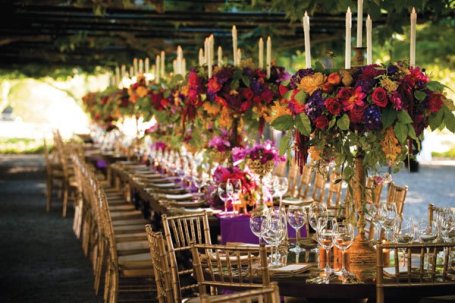
Photo by Susan Stripling
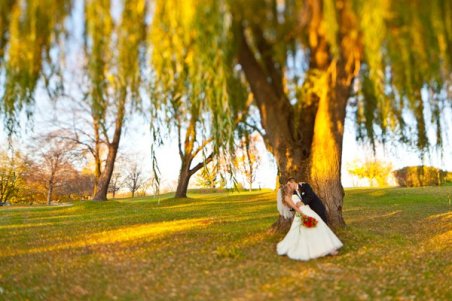
Photo by C. Tyson Photography
The best part about a winter wedding is that, for the most part, you are able to get exactly what you want for an incomparable price. Winter is the off-season for wedding vendors and venues which allows for more freedom in choosing. Because demand for vendors and venues is typically lower in the winter, cost tends to be down as well which is great for smaller budget weddings. With winter comes fresh snowfall (depending where in the USA you live). This is a photographers dream; you would look like you came straight out of a winter wonderland. There is something about freshly fallen snow that feels almost magical and fragile which plays beautifully with a bold, maroon bouquet and your white dress.
Even though the snowfall can end up being one of the best parts of your wedding, it very well may cause the most trouble. Terrible storms are a nightmare for vendors who have to transport food, drinks, equipment and people to your venue. It could cause a severe delay which is the last thing you want on one of the biggest days of your life. While daylight savings is one of the benefits of summer or fall wedding, it is harder to work around with a winter wedding. There is less daylight and the sun could set as early as 4:30pm.
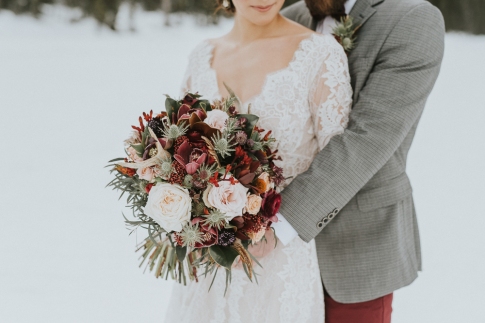
Photo by Darren Roberts Photography
And then there is spring. Spring has a very natural beauty that comes from the new flowers in bloom and lush greenery that is coming alive after the winter hibernation. The romantic, colorful pops of color accent a neutral palette wonderfully. This is the best season to have a larger wedding because guests are less likely to travel, although you would have to work around graduations, Easter and spring break. Since the weather isn’t too hot or too cold, there are very few restrictions in regards to your wedding dress. You could wear a strapless and not get too cold or you could wear a lace-sleeved dress and be comfortable as well.
With blooming flowers comes rain and happy bees with lots and lots of pollen. This is imperative to keep in mind if you want an outdoor wedding, especially in the south, because many of your guests will be allergic to pollen. There is not much worse than having puffy, red, itchy, watery eyes and nose on your wedding day and in your pictures. Not to mention, it will cause your guests to be very uncomfortable. Spring is also the time that wedding vendors bump up their prices in preparation for peak wedding season. If your wedding is in late spring, this is something to consider if you’re working with a tight budget.
Any season you choose to have your wedding in will be great; these are just a few tips and ideas to keep in mind when considering the date of your big day.













